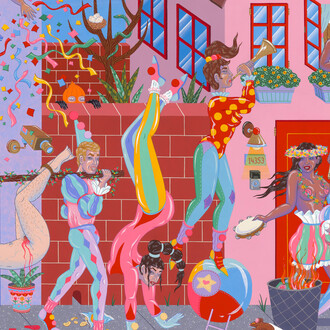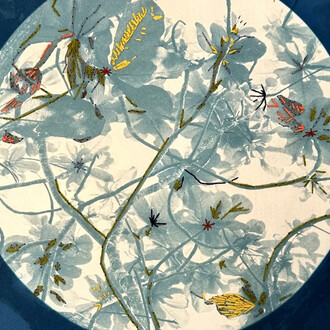Wilding Cran Gallery is pleased to present Chimeras, an exhibition of works by Elizabeth Malaska exploring feminine mythologies of protection and renewal.
Descending into a shadow world built below shifting ground, Elizabeth Malaska’s most recent body of work reflects upon notions of surrender as a process of repair. The artist’s canvases combine scenes of women in repose with suggestions of mythological antiquity, drawing parallels between perceptions of women as both vessels and catalysts.
The exhibition conjures a world resplendent with underlying narratives and perspectives that generate a space of guardianship and communion within moments of isolation. The three women in Den, 2024 sit on the floor of a brick room, vibrating with jewel tones. The figures are joined by spectral faces, a black cat, a pink travel cup, and a stone bench resembling a clawed mother wolf, a maternal guardian. The varying treatments of paint — some more in focus, others more obscured— lend a collaged aura to the piece, as though the elements had been stitched together in a dreamlike state. At the center of the gallery, the nearly immersive scale of All Be Your Mirror, 2023 brings allusions of Malaska’s studio practice into the physical space, offering a window into how we may locate reflections of the self through the act of creation.
Various animals feature prominently throughout the exhibition, as familiars to Malaska’s subjects, both wild and domesticated. Within those who were sacred have remained so, 2024, a nude figure lies on her back, enmeshed in the roots of a tree within which rest three peacocks, their tails reaching towards the floral earth below. The mirrored draping of entangled feathers, tree branches, and the limp human figure, reflect a visual and emotional sympathy shared by each of the painting’s inhabitants, so deeply intertwined that they come together to form a hybrid. The melded tones of calm and surrender elicit an effect embracing the freedom and beauty of emotional multitudes, at times isolating, at times restorative.
Alongside the works on canvas, the exhibition includes a selection of works on paper, culled from Malaska’s daily generative meditations in the studio. Installed in an annex of the gallery, the black ink portraits capture women in moments of solitude, evoking a range of emotions from loneliness and vulnerability to mischief and play. In this series, we see similar motifs to those present in the paintings, including several figures replete with anatomical anomalies — such as horns, fangs, claws, and wings — allowing the artist to humanize visual vocabularies of the monstrous.
Across the exhibition of Chimeras, Elizabeth Malaska’s fantastical beings serve as guardians, as protective beacons imbued with a divine feminine ferocity and tenderness. Through the process of rendering the disparate elements of her own dreams and fears, Malaska centers the liberating nature of such multitudes, granting them their own spaces to coexist as complex creatures with the power to disrupt, heal, and evolve.
This exhibition was made possible by the generosity of The Ford Family Foundation.
Elizabeth Malaska (b. 1978, Portland, OR) earned her BFA from California College of the Arts and her MFA in Visual Studies from Pacific Northwest College of Art. She is a 2021 Guggenheim Fellow, winner of the 2022 Betty Bowen Award, as well as the recipient of a Painter's and Sculptor's Grant from the Joan Mitchell Foundation and the Hallie Ford Fellowship from The Ford Family Foundation. Malaska's work is in the permanent collection at the Seattle Art Museum, the Portland Art Museum, the Schneider Museum of Art, and the Hallie Ford Museum. Her work has been featured in Ms.Magazine, Art in America, ArtForum, and ArtMaze among others. She lives and works in Portland, OR.
















